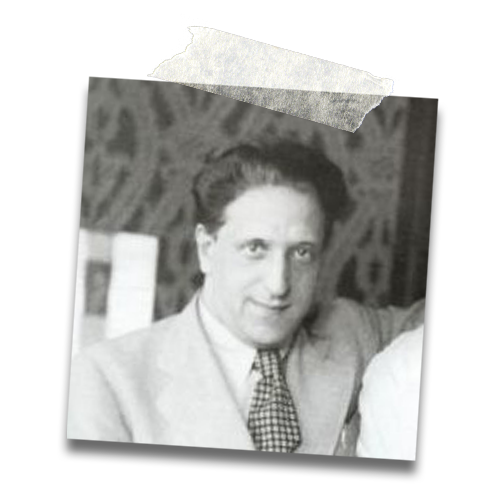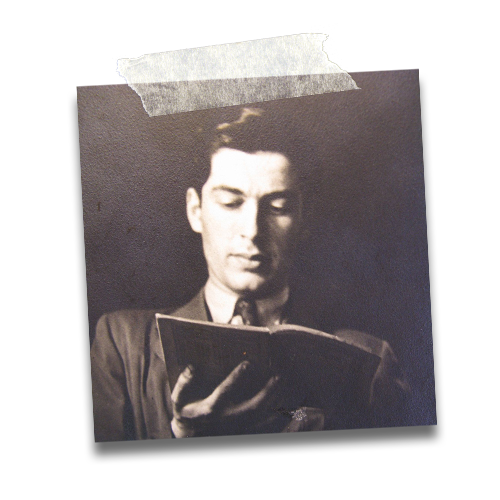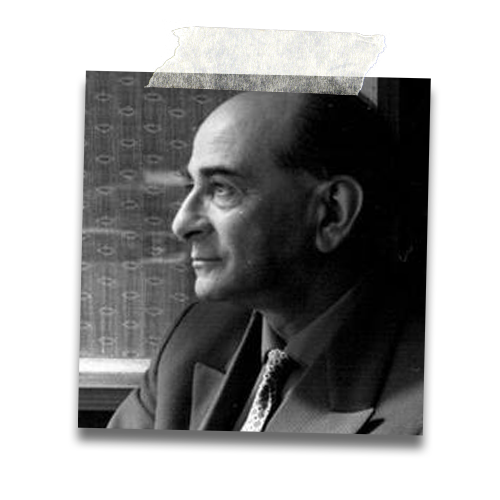Theresienstadt Composers
Amongst the extraordinary musicians kept prisoners in the Theresienstadt concentration camp were also some extremely talented composers. Pavel Haas, Gideon Klein, Hans Krasa and Viktor Ullmann all spent three years at Theresienstadt from 1941 to 1944. They were later joined by Hans Winterberg, another exemplary composer, who was in Theresienstadt from January to May 1945.
Except Winterberg, all these immensely talented men were victims of the Holocaust, and died at the hands of the Nazi regime. However, despite the atrocities that plagued the last few years of their lives, their dedication to music and composition never wavered and they became major contributors to the cultural phenomenon that constituted life in Theresienstadt.

Amongst the extraordinary musicians kept prisoners in the Theresienstadt concentration camp were also some extremely talented composers. Pavel Haas, Gideon Klein, Hans Krasa and Viktor Ullmann all spent three years at Theresienstadt from 1941 to 1944. They were later joined by Hans Winterberg, another exemplary composer, who was in Theresienstadt from January to May 1945.
Except Winterberg, all these immensely talented men were victims of the Holocaust, and died at the hands of the Nazi regime. However, despite the atrocities that plagued the last few years of their lives, their dedication to music and composition never wavered and they became major contributors to the cultural phenomenon that constituted life in Theresienstadt.

Pavel Haas
Pavel Haas was born in Brno in 1899 and spent his early life breathing in his town’s cultural atmosphere. Studying both piano and composition at the local conservatory, he stood out as a remarkable musician, and, between the years 1920 and 1921, studied under the great Moravian composer Leos Janácek.
A representative of the Czech avant-garde, his music recalls elements of folk and jazz mixed with a sense of rhythm, humour and the grotesque that he inherited from Stravinsky. Due to his self-criticism and his dedication to his family’s business, he was not as prolific as other composers. He wrote around 50 compositions but among those, he gave an opus number to only 18.
Dark times descended on Haas’s life when the Nazis occupied Czechoslovakia in 1939, and his works were prohibited due to the anti-Semitic racial laws in place. Forced to divorce his wife to save her and their daughter from suffering a similar fate to him, he was shortly transported to Theresienstadt.
In the concentration camp, after an initial period of low spirits, he continued to compose even under appalling living conditions. He was involved in the making of the Nazi propaganda film that aimed to convince the world that the Jews living in the camp were being treated well.
Ultimately, after the propaganda project was over, Haas was transported to Auschwitz on October 16 1944, where he was immediately murdered in the gas chambers.


Pavel Haas was born in Brno in 1899 and spent his early life breathing in his town’s cultural atmosphere. Studying both piano and composition at the local conservatory, he stood out as a remarkable musician, and, between the years 1920 and 1921, studied under the great Moravian composer Leos Janácek.
A representative of the Czech avant-garde, his music recalls elements of folk and jazz mixed with a sense of rhythm, humour and the grotesque that he inherited from Stravinsky. Due to his self-criticism and his dedication to his family’s business, he was not as prolific as other composers. He wrote around 50 compositions but among those, he gave an opus number to only 18.
Dark times descended on Haas’s life when the Nazis occupied Czechoslovakia in 1939, and his works were prohibited due to the anti-Semitic racial laws in place. Forced to divorce his wife to save her and their daughter from suffering a similar fate to him, he was shortly transported to Theresienstadt.
In the concentration camp, after an initial period of low spirits, he continued to compose even under appalling living conditions. He was involved in the making of the Nazi propaganda film that aimed to convince the world that the Jews living in the camp were being treated well.
Ultimately, after the propaganda project was over, Haas was transported to Auschwitz on October 16 1944, where he was immediately murdered in the gas chambers.
Gideon Klein

Composer and pianist Gideon Klein was an incredibly gifted musician. He was born in Prerov, Czechoslovakia, in 1919, and at the age of 20, he moved to Prague to study at the Prague Conservatory. Here he attended piano and composition classes while studying musicology at the Charles University.
His studies were brutally interrupted when the Nazi regime closed the Czech Universities, and Gideon was forced to decline his invitation to study at the Royal College of Music in London, as racial laws prohibited him from leaving the country. Before his deportation to Theresienstadt in December 1941, Gideon often illegally performed under a pseudonym or in secret concerts.
In the camp of Theresienstadt, he became one of the key personalities in the production and organization of musical activities. He gave piano and chamber music concerts, accompanied the choirs, and successfully composed exceptional works. He also made every effort to ensure the children of the camp maintained a good level of education, despite teaching them being forbidden.
He was deported to Auschwitz in October 1944 and then to the Polish labour camp of Fürstengrube, where he probably died at the age of 26. His sister Eliska was alongside him in Theresienstadt, but survived and thus dedicated her life to making his music known to the world.
Klein’s compositions contain references to Czech music in Leos Janacek’s style and reveal a profound study of the classical form and the Second Viennese School.
Composer and pianist Gideon Klein was an incredibly gifted musician. He was born in Prerov, Czechoslovakia, in 1919, and at the age of 20, he moved to Prague to study at the Prague Conservatory. Here he attended piano and composition classes while studying musicology at the Charles University.
His studies were brutally interrupted when the Nazi regime closed the Czech Universities, and Gideon was forced to decline his invitation to study at the Royal College of Music in London, as racial laws prohibited him from leaving the country. Before his deportation to Theresienstadt in December 1941, Gideon often illegally performed under a pseudonym or in secret concerts.
In the camp of Theresienstadt, he became one of the key personalities in the production and organization of musical activities. He gave piano and chamber music concerts, accompanied the choirs, and successfully composed exceptional works. He also made every effort to ensure the children of the camp maintained a good level of education, despite teaching them being forbidden.
He was deported to Auschwitz in October 1944 and then to the Polish labour camp of Fürstengrube, where he probably died at the age of 26. His sister Eliska was alongside him in Theresienstadt, but survived and thus dedicated her life to making his music known to the world.
Klein’s compositions contain references to Czech music in Leos Janacek’s style and reveal a profound study of the classical form and the Second Viennese School.

Hans Winterberg

Composer Hans Winterberg was born in Prague in 1901. He began studying piano at the age of 9, and later attended the Prague Academy of Music and Performing Arts, studying compositions with Alois Hába, and conducting with Alexander Zemlinsky. While dedicating himself to composition, he also worked as a répétiteur, mostly in Brno.
Winterberg was married to a Catholic woman, and for this reason, he was deported to Theresienstadt considerably later than the other Jewish composers. After a forced divorce, he was sent to the camp in January 1945 and stayed there until its liberation in May. By the time Winterberg reached Theresienstadt, the other famous composers had already been transported to the extermination camps in Poland. However, some performers were still in the camp, keeping alive the spirit of the concert.
He spent the following years going back to collect the manuscripts of the works he had written and hidden during his imprisonment, such as the “Suite Theresienstadt”. After the war, he returned to Prague, later establishing himself in Bavaria, where he worked for the Bavarian radio by teaching, composing and painting.
He died in 1991, leaving a great number of compositions that have sadly remained locked up in the Sudeten German Music Archive in Regensburg. Winterberg’s grandson Peter Kreitmer has been making every effort to get his music performed again.
Hans Winterberg’s compositional style combines polyrhythm and polytonality with moments of depth and lyricism.
Composer Hans Winterberg was born in Prague in 1901. He began studying piano at the age of 9, and later attended the Prague Academy of Music and Performing Arts, studying compositions with Alois Hába, and conducting with Alexander Zemlinsky. While dedicating himself to composition, he also worked as a répétiteur, mostly in Brno.
Winterberg was married to a Catholic woman, and for this reason, he was deported to Theresienstadt considerably later than the other Jewish composers. After a forced divorce, he was sent to the camp in January 1945 and stayed there until its liberation in May. By the time Winterberg reached Theresienstadt, the other famous composers had already been transported to the extermination camps in Poland. However, some performers were still in the camp, keeping alive the spirit of the concert.
He spent the following years going back to collect the manuscripts of the works he had written and hidden during his imprisonment, such as the “Suite Theresienstadt”. After the war, he returned to Prague, later establishing himself in Bavaria, where he worked for the Bavarian radio by teaching, composing and painting.
He died in 1991, leaving a great number of compositions that have sadly remained locked up in the Sudeten German Music Archive in Regensburg. Winterberg’s grandson Peter Kreitmer has been making every effort to get his music performed again.
Hans Winterberg’s compositional style combines polyrhythm and polytonality with moments of depth and lyricism.


